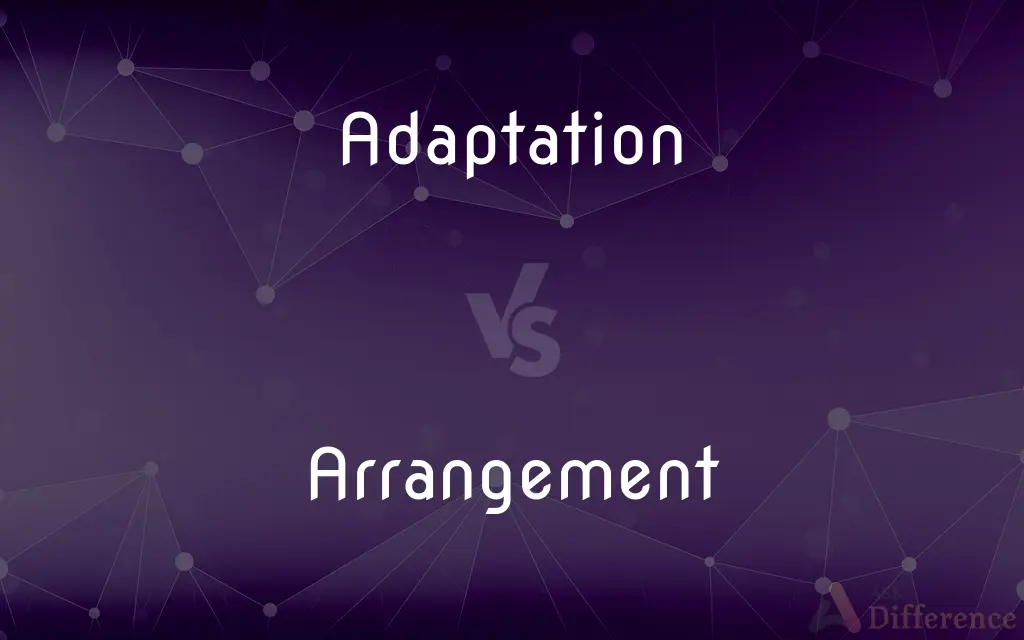Adaptation vs. Arrangement — What's the Difference?
By Fiza Rafique & Maham Liaqat — Updated on March 29, 2024
Adaptation involves altering content to fit different media or audiences, focusing on compatibility. Arrangement refers to rearranging existing musical compositions, prioritizing coherence and musicality.

Difference Between Adaptation and Arrangement
Table of Contents
ADVERTISEMENT
Key Differences
Adaptation is the process of modifying a work, such as a novel, play, or film, to make it suitable for a different format or audience, ensuring it retains its essence while fitting its new context. On the other hand, arrangement involves taking an existing piece of music and altering its structure, instrumentation, or style to create a new version that maintains the original's spirit but offers a fresh perspective.
While adaptations often require significant changes to plot, character development, or setting to suit different media or cultural contexts, arrangements focus on musical elements. They might adjust a piece for different instruments or voices, alter the tempo, or change the genre, enhancing the piece's appeal to different audiences or performers.
Adaptation is a creative and interpretive process that can bridge diverse cultures and mediums, introducing original works to new audiences. In contrast, arrangement is an art that requires a deep understanding of musical theory and the nuances of composition, aiming to preserve the integrity of the original music while introducing innovation.
In the realm of literature and film, adaptation plays a crucial role in storytelling, allowing stories to transcend their original form and reach broader audiences. Arrangements, however, enrich the musical experience, offering listeners and performers new ways to engage with familiar compositions.
Finally, the success of an adaptation is often measured by how well it captures the original work's essence while making it accessible and relevant to a new audience. For arrangements, success is gauged by the arrangement's musicality, coherence, and how it honors the original composition's intent.
ADVERTISEMENT
Comparison Chart
Definition
Modifying content for different media/audiences
Rearranging music for different settings/styles
Focus
Compatibility with new formats or audiences
Musical coherence and innovation
Key Changes
Plot, characters, setting
Instrumentation, tempo, genre
Goal
To make content relevant and accessible
To offer a new musical perspective
Measurement of Success
Captures original essence, appeals to new audience
Maintains musicality, respects original intent
Compare with Definitions
Adaptation
The process of modifying a work to suit a different medium.
The novel's adaptation into a film required significant changes to its storyline.
Arrangement
Altering a music piece's structure or instrumentation.
The arrangement for the choir transformed the pop song into a classical piece.
Adaptation
Ensures a story or concept remains engaging across different platforms.
The game's adaptation for mobile devices introduced simplified controls.
Arrangement
Can introduce a new genre or style to the original work.
The jazz arrangement of the folk song gave it a completely new vibe.
Adaptation
Can involve changes to cater to cultural differences.
The adaptation of the TV show for an international audience included diverse cast members.
Arrangement
Provides new ways to experience familiar music.
The symphonic arrangement of video game music appealed to a wide audience.
Adaptation
Aims to retain the original's essence while making it accessible.
The stage adaptation of the book focused on capturing the characters' depth.
Arrangement
Tailored to fit different musical ensembles or soloists.
The piano arrangement of the orchestral work allowed solo performances.
Adaptation
Bridges the gap between original works and new audiences.
The graphic novel adaptation introduced the classic tale to younger readers.
Arrangement
Focuses on coherence and respect for the original composition.
The arrangement maintained the melody's integrity while adding complex harmonies.
Adaptation
In biology, adaptation has three related meanings. Firstly, it is the dynamic evolutionary process that fits organisms to their environment, enhancing their evolutionary fitness.
Arrangement
In music, an arrangement is a musical reconceptualization of a previously composed work. It may differ from the original work by means of reharmonization, melodic paraphrasing, orchestration, or development of the formal structure.
Adaptation
The act or process of adapting.
Arrangement
The action, process, or result of arranging or being arranged
The arrangement of the furniture in the room
Adaptation
The state of being adapted.
Arrangement
A plan or preparation for a future event
All the arrangements for the wedding were made
Adaptation
Something, such as a device or mechanism, that is changed or changes so as to become suitable to a new or special application or situation.
Arrangement
A musical composition arranged for performance with instruments or voices differing from those originally specified
Mozart's symphonies in arrangements for cello and piano
Adaptation
A composition that has been recast into a new form
The play is an adaptation of a short novel.
Arrangement
A settlement of a dispute or claim.
Adaptation
Change or adjustment in structure or habits by which a species becomes better able to function in its environment, occurring through the course of evolution by means of natural selection.
Arrangement
The act or process of arranging
The arrangement of a time and place for the meeting.
Adaptation
A structure or habit that results from this process.
Arrangement
The condition, manner, or result of being arranged; disposal
Provided flowers and saw to their arrangement.
Adaptation
(Physiology) The responsive adjustment of a sense organ, such as the eye, to varying conditions, such as light intensity.
Arrangement
A collection of things that have been arranged
The circular arrangement of megaliths called Stonehenge.
Adaptation
Change in behavior of a person or group in response to new or modified surroundings.
Arrangement
Often arrangements A provision or plan made in preparation for an undertaking
Made arrangements for surgery.
Adaptation
(uncountable) The process of adapting something or becoming adapted to a situation; adjustment, modification.
Arrangement
An agreement or settlement; a disposition
Our dog will be looked after by arrangement with a neighbor.
Adaptation
(countable) A change that is made or undergone to suit a condition or environment.
Arrangement
An adaptation of a composition for other instruments or voices or for another style of performance.
Adaptation
The process of change that an organism undergoes to be better suited to its environment.
Arrangement
A composition so arranged.
Adaptation
An instance of an organism undergoing change, or the structure or behavior that is changed.
Arrangement
The act of arranging.
Adaptation
(uncountable) The process of adapting an artistic work from a different medium.
Arrangement
The manner of being arranged.
Adaptation
An artistic work that has been adapted from a different medium.
Arrangement
A collection of things that have been arranged.
Adaptation
(sociology) The means by which social groups adapt to different social and physical environments.
Arrangement
A particular way in which items are organized.
Adaptation
The act or process of adapting, or fitting; or the state of being adapted or fitted; fitness.
Arrangement
(in the plural) Preparations for some undertaking.
Adaptation
The result of adapting; an adapted form.
Arrangement
An agreement.
Adaptation
A written work (as a novel) that has been recast in a new form;
The play is an adaptation of a short novel
Arrangement
(music) An adaptation of a piece of music for other instruments, or in another style.
Adaptation
The process of adapting to something (such as environmental conditions)
Arrangement
The act of arranging or putting in an orderly condition; the state of being arranged or put in order; disposition in suitable form.
Adaptation
(physiology) the responsive adjustment of a sense organ (as the eye) to varying conditions (as of light)
Arrangement
The manner or result of arranging; system of parts disposed in due order; regular and systematic classification; as, arrangement of one's dress; the Linnæan arrangement of plants.
Arrangement
Preparatory proceeding or measure; preparation; as, we have made arrangement for receiving company.
Arrangement
Settlement; adjustment by agreement; as, the parties have made an arrangement between themselves concerning their disputes; a satisfactory arrangement.
Arrangement
The adaptation of a composition to voices or instruments for which it was not originally written.
Arrangement
The thing arranged or agreed to;
They made arrangements to meet in Chicago
Arrangement
An orderly grouping (of things or persons) considered as a unit; the result of arranging;
A flower arrangement
Arrangement
An organized structure for arranging or classifying;
He changed the arrangement of the topics
The facts were familiar but it was in the organization of them that he was original
He tried to understand their system of classification
Arrangement
The spatial property of the way in which something is placed;
The arrangement of the furniture
The placement of the chairs
Arrangement
A piece of music that has been adapted for performance by a particular set of voices or instruments
Arrangement
The act of arranging and adapting a piece of music
Common Curiosities
How does an arrangement differ from a cover?
An arrangement reimagines the structure, style, or instrumentation of a piece, while a cover generally performs the piece without significant changes to its original form.
Are arrangements only for classical music?
Arrangements can be made for any type of music, from classical to pop, allowing for creative reinterpretations across genres.
Is it more challenging to adapt a book into a movie or to arrange an orchestral piece for a solo instrument?
Both processes have unique challenges; adaptations must condense and visualize complex narratives, while arrangements require maintaining musicality within new limitations.
How important is fidelity to the original in adaptations?
Fidelity is subjective and varies depending on the goals of the adaptation; some prioritize staying true to the source, while others focus on adaptation for new contexts.
Do arrangements require permission from the original composer?
Depending on copyright laws and the intended use, arrangements might require permission from the copyright holder to legally perform or distribute.
Can adaptations improve upon the original?
Adaptations can offer new insights or perspectives on the original work, potentially introducing improvements or highlighting aspects not evident in the original.
What is the purpose of adaptation?
The purpose of adaptation is to modify a work so it fits a different medium or appeals to a different audience, ensuring it remains relevant and engaging.
Do adaptations always involve major changes?
Not necessarily; the extent of changes depends on the adaptation's goals and the differences between the original and new mediums.
Can any work be adapted or arranged?
In theory, yes, but the success of adaptations and arrangements depends on creative choices, legal considerations, and audience reception.
How do audiences typically respond to adaptations and arrangements?
Responses can vary widely, from enthusiastic acceptance to criticism, often influenced by attachment to the original and expectations for the new form.
Share Your Discovery

Previous Comparison
Restauration vs. Restore
Next Comparison
Hospitalisation vs. HospitalizationAuthor Spotlight
Written by
Fiza RafiqueFiza Rafique is a skilled content writer at AskDifference.com, where she meticulously refines and enhances written pieces. Drawing from her vast editorial expertise, Fiza ensures clarity, accuracy, and precision in every article. Passionate about language, she continually seeks to elevate the quality of content for readers worldwide.
Co-written by
Maham Liaqat















































